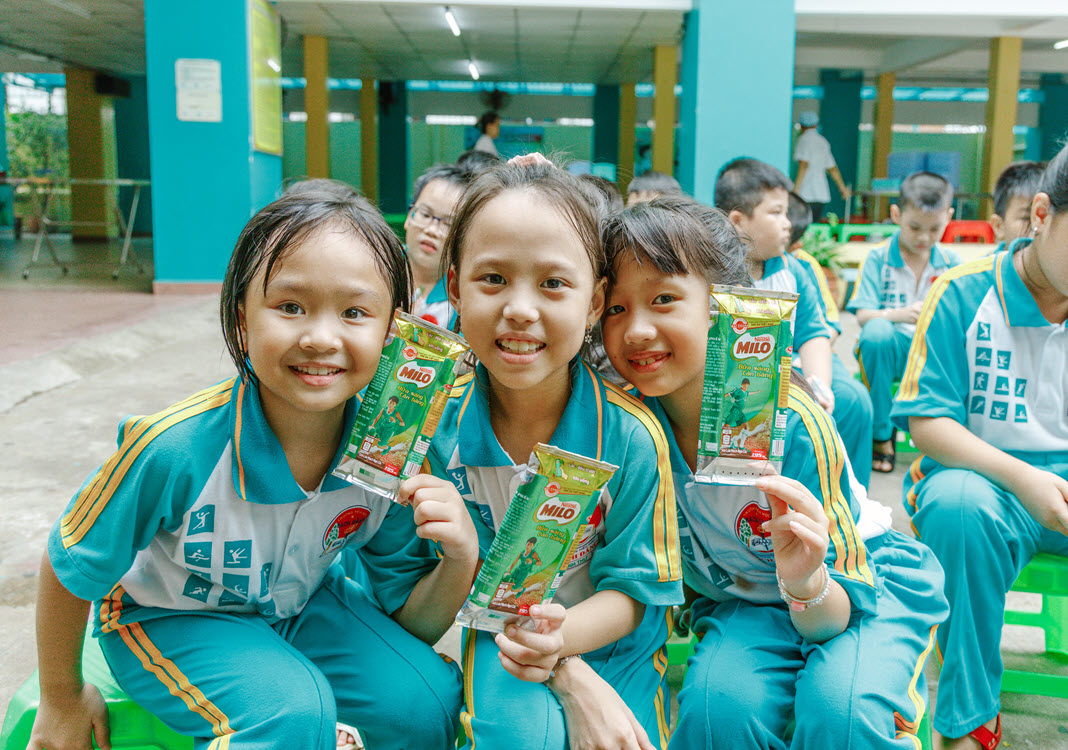With “Creating Shared Value” as its core business practice, Nestlé Vietnam has managed to weather the storm of Covid-19, an unprecedented public health crisis that has upended all aspects of life in many parts of the world including Vietnam, while keeping its efforts to contribute positive values to consumers, farmers, shareholders as well as its business partners in Vietnam.
Nestlé Vietnam has recently taken the position of Vietnam Business Council for Sustainable Development (VBCSD) Co-chair. VCCI–VBCSD is among the most reputable organizations in Vietnam. It has demonstrated its active role in encouraging the business community to participate and contribute to the sustainable development of the country.
With sustainability being its global commitment and top priority, Nestlé Vietnam focuses its work on three interconnected impact areas including tackling climate change, shaping a waste-free future, and promoting gender balance.
Tackling climate change
All of Nestlé factories in Vietnam have managed to achieve Zero Waste to Landfills since 2017. The company adopted renewable energy which contributes to a reduction of 60% in carbon dioxide emission in the past 10 years. The Beans to Brick model is one of its success stories where coffee grounds are turned into biomass and unburnt bricks for commercial and residential buildings.
In Tri An Factory in the southern province of Dong Nai, 60% of water used in coffee production is treated and reused meeting Grade-A standard.
In addition, more than 21,000 coffee farms within the Nescafé supply chain have been 4C certified. Furthermore, by applying sustainable farming practices, coffee farmers have reduced some 40% of water for irrigation and 20% of chemical fertilizers/pesticides and increased their incomes by 30-100% owing to proper intercropping models.
The Nescafé Plan, in cooperation with WASI, has distributed more than 46 million plantlets of high-yielding and disease-resistant coffee varieties to coffee growers in the Central Highlands. This has helped renew over 36,000 hectares of aged and low-productive coffee areas and provide strong support to the national coffee rejuvenation program.
Also, the company is working with the World Bank and other stakeholders in 2030 Water Resource Group.
Shaping a waste-free future
Nestlé Vietnam and La Vie Ltd. have joined forces to help shape up a zero-waste future, aiming at fighting climate change.
“We are taking leadership in reducing the environmental impact of our products and have committed to making 100% of our packaging recyclable or reusable by 2025,” said a Nestlé Vietnam representative.
Last year, Nestlé Group launched its Institute of Packaging Sciences, dedicated to the discovery and development of functional, safe and environmentally friendly packaging solutions.
In Vietnam, Nestlé Vietnam and La Vie are among founding companies to establish Packaging Recycling Organization Vietnam (PRO Vietnam), a social organization to tackle plastics waste. PRO Vietnam focuses on raising awareness about recycling among customers, strengthening the existing packaging collection ecosystem, and supporting recycling programs of processors and recyclers.
Moreover, Nestlé Vietnam was the first company to adopt paper straws for its ready-to-drink products in the country. The adoption of paper straws for first two products, MILO Breakfast and Nesvita, will help reduce over 10 tons of plastics per year.
The firm also partnered with mGreen, a social enterprise/mobile app developer, to implement a waste collection and segregation project at schools and residential buildings in HCMC. The project has been implemented for two years at four primary and secondary schools with the participation of 10,000 school students, teachers and parents.
Promoting gender balance
Gender balance is a key component of Nestlé’s approach to diversity and inclusion. In Vietnam, the firm has made significant progress in recent years with more than 50% of senior managerial positions now held by women.
The firm has cooperated with the Vietnam Women Union to implement Chi Nest project to provide nutritional knowledge and to improve income for rural women. Through the NESCAFE Plan, Nestlé Vietnam has empowered rural women to become farming leaders who play an active role in promoting sustainable coffee cultivation practices.

Weathering the Covid-19 storm
During the Covid-19 pandemic, the company did not lay off anyone or reduce their incomes and incentives. For instance, in February this year, the company anticipated that many of its sales staff would miss their targets, so it decided to offer incentives and benefits based on their efforts and not on sales target achievement.
Since March, Nestlé Vietnam has joined hands with the Government, local authorities and business partners to implement various programs to help serve the country’s fight against Covid-19, with donations of over VND12 billion in cash and in kind, 88,000 medical face masks worth VND1.4 billion donated to support health care workers at the frontline.
Moreover, the firm provided support to 22,000 small business partners, including small restaurants, street food vendors and school canteens that have been hard hit by the pandemic with free Nestlé products worth VND22 billion.
Last month, in assisting Central Vietnam severely hit by overlapping floods and landslides as well as rescue forces that are constantly risking themselves, Nestlé Vietnam donated nutritional food and drink products valued at VND2.1 billion to the region.
Nestlé Vietnam has continuously and consistently delivered its commitments to contribute to the sustainable and inclusive development for Vietnam.
By Hong Ngan











